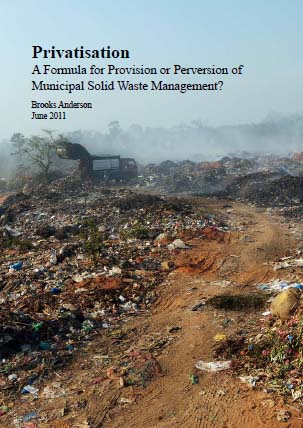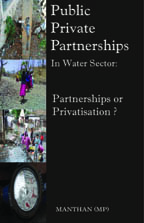/topics/public-infrastructure-and-services
Public Infrastructure and Services
Centrally sponsored schemes ARWSP and TSC have not done enough to ensure right to water and basic sanitation : Article from Combat Law
Posted on 28 Jun, 2011 04:59 PMThe Universal Declaration of Human Rights (1948) recognises the inherent dignity and the equal and inalienable rights of all human beings. There are certain basic needs that are essential for a dignified life. Water and sanitation are two of these essential human needs and a clean environment is also increasingly recognised as a fundamental human right.
Challenges of food security and its management: A position paper by the National Rainfed Area Authority
Posted on 28 Jun, 2011 08:07 AM The paper also discusses their future potential and possible impact on national food security of diversification into non-PDS, fruits, vegetables and other commercial crops. This kind of analysis is likely to help planners and policy makers in choosing appropriate policy framework in evolving the strategies for enacting and operationalization of Food Security Act.
The paper also discusses their future potential and possible impact on national food security of diversification into non-PDS, fruits, vegetables and other commercial crops. This kind of analysis is likely to help planners and policy makers in choosing appropriate policy framework in evolving the strategies for enacting and operationalization of Food Security Act.
With increase in population, income and urbanization, the demand for food grains has also increased and diversified. Although there has been more than four-fold increase in food grain production from 1950-51 (50.82 mt) to 2008-09 (233.88 mt), a large section of our population continues to suffer from malnutrition and inadequacy of food grains. On the other hand degradation of land, water and other natural resources have started impacting production through increased biotic and abiotic stresses.
Assessment study of impact and sustainability of Nirmal Gram Puraskar – A report by CMS Environment
Posted on 24 Jun, 2011 11:02 PMNGP was initiated in Oct 2003 to encourage Panchayati Raj Institutions (PRIs), block and districts to take up sanitation promotion, a post achievement, award-cum-fiscal incentive scheme. The eligibility criteria for the PRIs to receive NGP include: Gram Panchayats, Blocks and Districts, which achieve 100 per cent sanitation coverage in terms of: (1) 100 per cent sanitation coverage of individual households (2) 100 per cent school and anganwadis sanitation coverage (3) Free from open defecation and (4) Clean environment maintenance (liquid and solid waste management).
Is privatisation a formula for provision or perversion of municipal solid waste management?
Posted on 24 Jun, 2011 09:17 PM
In 2000, in response to a Supreme Court order, the Government of India formulated and enacted the Municipal Solid Wastes (Management and Handling) Rules (hereafter referred to as the Rules) to mitigate a burgeoning solid waste crisis. Pollution from haphazard municipal solid waste disposal was gravely jeopardizing public health, thereby undermining the nation’s development gains.
The Rules’ prime objective was to protect public health and the environment by minimizing disposal of waste in landfills, thereby aligning the government’s municipal waste management policy with its commitments to international treaties to reduce greenhouse gas emissions, control the production of persistent organic pollutants, conserve finite resources, and achieve broad development targets.
Alternate management approaches for village water supply systems - Case studies from Maharashtra - A field note by WSP
Posted on 23 Jun, 2011 05:25 PMIt documents the approaches in a context where the state government agencies responsible for construction and management of rural water supply systems have been found to be facing limitations in O&M arrangements.
The traditional approach to provision of rural water supply in India has been supply driven, with emphasis on norms and targets and on construction and creation of assets, but with very little concern for sustainable arrangements for better management and maintenance of the facilities built. The viewpoint that users are ‘beneficiaries’ rather than empowered stakeholders among the service providers has led to alienation of the users.
Survey of recent sanitation achievement in Himachal Pradesh - A study by Institute of Development Studies
Posted on 23 Jun, 2011 10:35 AMThis report of a study commissioned by the Institute of Development Studies on the Community Led Total Sanitation (CLTS) site presents the findings of the survey that was conducted in Himachal Pradesh to assess the progress made by the state in rural sanitation, in the context of the sanitation revolution, which is said to have occurred in the state of Himachal Pradesh in the last few years.
Himachal Pradesh has a population of about 6.9 million and is over 90% rural. It has a relatively good record on human development indicators and access to public services. However, it showed a dismal awareness on the sanitation front till a few years ago.For example, in 2004, household toilet coverage in rural areas of Himachal Pradesh was estimated at about 28%. In early 2005, the Government of Himachal Pradesh adopted a new strategy to secure better rural sanitation results, which included:
Public Private Partnerships in the water sector: Partnerships or privatisation - A report and video by Manthan Adhyayan Kendra
Posted on 21 Jun, 2011 05:29 PM
This report and video by Manthan Adhyayan Kendra, looks at various aspects of PPPs, beginning from why PPPs have come to be regarded as the major approach for infrastructure development in the country, the circumstances that lead to the change in approach from direct privatisation to public-private partnerships, the current status of the PPP projects that are being executed in India, especially in the water sector, to the current estimates and projections of investment requirements for infrastructure development in India by governments and International Financial Institutions (IFIs).
From dreams to reality - Compendium of best practices in rural sanitation in India - A document by the Water and Sanitation Programme and the Ministry of Rural Development
Posted on 19 Jun, 2011 05:50 PMThis compendium by the Water and Sanitation Programme and the Ministry of Rural Development, Government of India presents case studies about the achievements and experiences of different situations, institutional models, community mobilisation approaches, supply chain management techniques, capacity building methods, convergence of various programmes, school sanitation, innovative approaches etc from different states and regions in the country.
After a decade of launching the Total Sanitation Campaign, India has seen significant successes in terms of the sanitation coverage, creating open defecation communities/GPs and solid and liquid waste management. Thousands of success stories have emerged across the country while still there are many challenges in making the entire rural India Nirmal and sustaining the changes achieved.
Model muncipal law - Ministry of Urban Development and Poverty Alleviation (2003)
Posted on 18 Jun, 2011 10:08 PMThis document includes the details of the Model Municipal Law and includes the details of :
The Karnataka Muncipal Corporation Act (1976)
Posted on 18 Jun, 2011 05:08 PMThe document describes the details of the Karnataka Municipal Corporations Act and includes:
- The short title, extent and commencement
- Definitions
- Details of the establishment of the corporation
- Municipal authorities
- Elections
- Powers and functions of the corporation and other authorities
- Proceedure of corporation and committees





